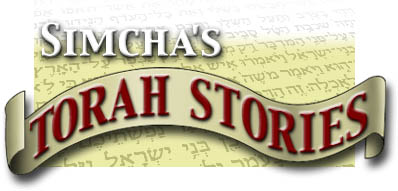Simcha's Torah Stories - Kedoshim

Parshat Kedoshim
ALL RISE
Mommy, can I play and do homework at Chaim's house this afternoon?
Yes you may, David. Just be home for dinner.
I'll leave their house when Chaim's father comes home from work.
Fine, David. Have fun.
Later that afternoon ...
David, we're having such good fun! Can you stay longer?
I can stay until your father comes home.
That will be in a few minutes.
Sure enough, in a few minutes there is a knock at the door.
Hello everyone, I'm home.
Everyone stands up when Chaim's father enters the room.
Hi Daddy. How do you feel after a long day at work?
It's great to be home, Chaim. Who is this guest that we are honored to have with us today?
This is my friend from school, David. He has been playing here all afternoon.
Nice to meet you David. Can you stay for dinner?
Thank you very much for the invitation, but I cannot stay today. I must leave now because my mom told me to be home for dinner.
Okay, maybe another time. Chaim, make sure that you walk David out daled amos to get the mitzvah of escorting guests.
Thank you so much for coming David.
Chaim, can I ask you something?
Sure, David.
Why did everyone stand up when your father walked into the room?
It's a mitzvah.
Really? Where is it found in the Torah?
This week's Torah portion, David, parshas Kedoshim. The verse states, "A person shall revere his Father and Mother" (Vayikra 19:3).
Wait a minute, Chaim. I thought that we have a mitzvah to honor our parents. It is one of the Ten Commandments.
Very good, David. Honoring parents and revering them are two separate mitzvos.
What's the difference?
The Talmud (Tractate Kiddushin p. 30-32) explains that by serving them and caring for their needs, one fulfills the mitzvah of honoring them. Reverence is shown by not standing or sitting in their place, not contradicting them, and not calling them by name. The Rambam (Laws of the Rebellious 6:4) states that a son should rise in the presence of his father, even if the father is a Torah student of the son. Normally a student must rise before his teacher of Torah, but here the honor of the father takes precedence, and the son must rise before the father.
I see. That is why you stood up when your father walked into the room, to show your respect for him.
It is a very important mitzvah, David. We trace our Jewish heritage back to the giving of the Torah at Mount Sinai, 3300 years ago. Each generation is one step farther from that awesome event. My father is closer to Mount Sinai than I am. Therefore, I must respect him.
This is fascinating, Chaim. Please tell me more.
My parents brought me into this world. Without them, I would not be here. The Talmud (Kiddushin 30b) states that there are three partners in the creation of a person - G-d, his father, and his mother. When a person honors his parents, G-d rewards them as if He Himself lives amongst them and the children honored Him.
Wow! Honoring you parents is like honoring G-d.
That is correct. There is something else that is important to know, David.
Tell me Chaim, I'm all ears.
We are all tempted to go against our parents from time to time. We want to go somewhere and they do not allow it. The urge to go behind their back is very strong. However, when you stand up for them when they enter the room, you develop the habit of respecting them with your actions. You realize that they are from a different generation. They are older and wiser. They deserve honor. How could you think of not listening to them?
Oy vey! I just remembered. I told my mother that I would come home when your father arrived. I'm late! I must keep my word to her!
David, I see that you are already fulfilling this mitzvah of honoring and revering parents.
Chaim, the next time I see you I hope to report that I am fulfilling the mitzvah of standing up for them.
David, I am sure that you will "rise" to the occasion.
Ohr Somayach's Youth Page r
General Editor: Rabbi Moshe Newman
Production Design: Michael Treblow






